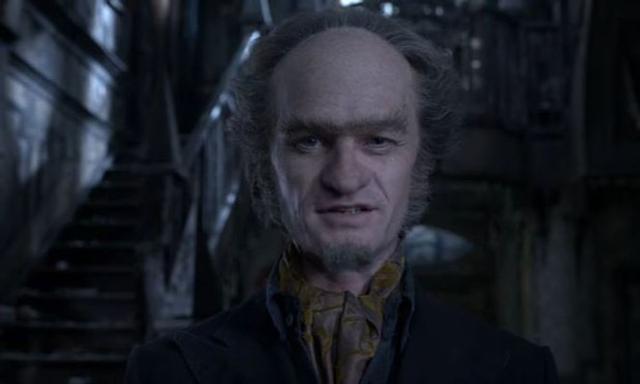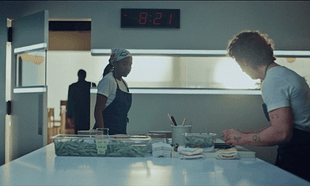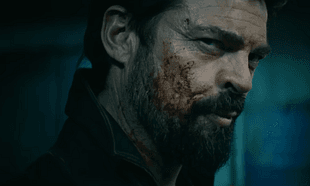A Series of Unfortunate Events follows the three Baudelaire children – Violet, who has a talent for inventing with a minimal amount of resources, Klaus, an avid reader who absorbs information like a sponge, and Sunny, a baby who cannot speak but has sharp teeth she likes to apply practically. They live a happy life until a fire kills their parents and destroys their home. They are put in the care of Count Olaf, who is cruel to the siblings and cares only about their fortune. They come into the guardianship of a number of other strange individuals but are relentlessly pursued by Count Olaf.
A Series of Unfortunate Events is, it is first of all worth saying, an excellent example of an adaptation done right. Mind you, a television series has a longer time span than a movie does in which to get its literary source right (the 2004 film starring Jim Carrey, which had a moxed reception, will inevitably come to mind when watching this) but it is still a testament to the show.
As you get with any adaptation, there are changes made for the sake of time, budget constraints, or other factors, but A Series of Unfortunate Events still remains for the vast majority faithful to the story events and book characters. Moreover it is faithful to the dead pan tone of the books and uses a number of direct quotations from the series that remain humorous within our more modern context (the books being between 11 and 18 years old now).
The most obvious ways in which the series diverges from the books make sense in terms of suspense and the binging nature of Netflix series viewing. Hints that the Baudelaire parents have a past that the children don’t know about, and one that connects the siblings to these strangers who they come into the guardianship of, are dropped very early on. There is also a new character who wasn't in the books at all named Jacqueline, the secretary of Mr Poe (the hapless banker responsible for the children’s guardianship), who also seems to have connections to the Baudelaires and cares about their wellbeing for reasons as yet unknown.

As for other characters, Neil Patrick Harris (and expect to see another HIYMY cast member here too) gets first billing as Count Olaf, and he is as wonderful as you’d expect him to be. Next up is Patrick Warburton, who is really fantastic as Lemony Snicket, his voice is authoritative and perfect in its delivery of the series’ distinct dead-pan humour (a quality that links the many characters of this world), yet it also has a vibrant energy.
Count Olaf’s numerous accomplices bring silly but fun comic relief, and the Baudelaires’ guardians Aunt Josephine, played by Alfre Woodard, and especially Uncle Monty, brought to life by Aasif Mandvi, are a joy to watch. As for the children themselves, the results here are more mixed. While Louis Haynes is very good as brother Klaus, Malina Weissman is not always believable as the eldest child, Violet. She plays the part a little too tenuously for one to believe this is the leader of the family in the aftermath of the death of her and her siblings’ parents.
Then again, the relatively weaker characterisation of the children, in comparison to the wildly exaggerated characters they are surrounded by, is not necessarily a bad thing. After all, one gets the sense that they are only one part of this vast world, and what a magnificent design that world is. The use of colours is expertly handled, with the children dressed brightly to make them stand out from the muted shades of the environments they inhabit. There is so much to look at that they become akin to accessories but, again, that isn’t necessarily a negative. After all, the person who is really the protagonist here (the word protagonist means character who forces the action in a play, film or novel, and can also be defined as the advocate or champion of a particular cause or idea, both of which definitions apply here) is really Count Olaf.
.jpg)
Another difficulty that the series had to get past is balancing the dark things that happen in the story with the sense of humour it also wants to get across. Again, the show turns to its literary source for much of its dialogue in this respect and it really works. The changes between fun and hilarious with tragic and indignant moments does not leave one in despair (as the series so consistency tongue-in-cheek assures you will be), but rather invested, engaged and thrilled.
At that, there is a twist in the second last episode that leaves you so dispossessed that you may just want to, as they’ve been encouraging you all along, switch off. There’s also a terrible misstep in the final minutes of the show where the cast sing a song which is just really cringey, forced and ill-fitting, and this after everything else between production, characterisation, story and dialogue have fit together so neatly.
Still, a second series is now in production and the current objective, though not yet given the green light, is to make a third in order to finish all thirteen books. Here’s hoping its few blemishes are ironed out in time and that those behind the show pursue with everything they got right.








































































